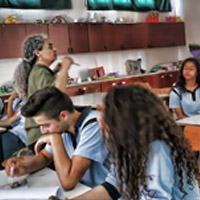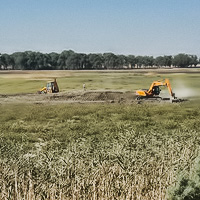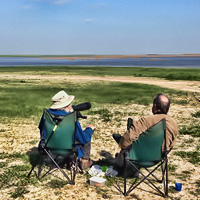
Raising awareness
amongst villagers of their natural heritage and ecotourism assets through awareness raising workshops and activities.
All you need to know about 'Hotspot for Birdwatchers' project
The ‘Kukla Wetlands Birdwatching Centre’ was conceived from the idea of creating a hotspot that both local and international birdwatchers would visit with priority in Cyprus. It will represent the first complete example of a birdwatching centre in the northern part of Cyprus which will add to the value of this region - hence of Cyprus - as an international birdwatching destination.
The first stage of the ‘Kukla Wetlands Birdwatching Centre’, called the 'Hotspot for Birdwatchers' project is funded by the European Union within the scope of Community Development through Village Initiatives grant scheme and implemented in collaboration with Beyarmudu Belediyesi. With this grant the site will be partly organized as a birdwatching centre, and research will be dedicated to understanding the long term management requirements of the site for our future commitment.
Our overall aim is to conserve the natural heritage of Cyprus, by promoting it as a birdwatching destination, showcasing one of the most undervalued natural part of the island. KUŞKOR The North Cyprus Society for the Protection of Birds and Nature
Birdwatching is an observation sport and is an important aspect of the science of ornithology. It basically involves locating, identifying and counting birds and observing their behaviour within their natural habitat. Most birders keep records and during their travels submit these to local conservation bodies such as KUSKOR, who then use such information in their monitoring and to direct conservation efforts effectively. Birds are sensitive to environmental conditions and are known as “indicator species”. When they are regularly monitored, they can act as a warning system to local environmental problems, such as excessive use of agricultural chemicals as well as to international problems such as climate change. Therefore, promotion of birdwatching is a useful component of any conservation strategy.
To the individual, birdwatching is a great way to explore new regions. In order to see the full range of bird species that a region has to offer, birders are required to get to alternative locations. It is not just about going off the beaten track into pristine wilderness; sewage treatment works, dumps and quarries can be just as important. Consequently, establishing bird tourism is a good way to bring money into economically marginalised areas, which are otherwise considered to be off the traditional tourism map. As a result, birdwatching is a popular touristic activity used in conjunction with conservation initiatives around the world as a tool for sustainable development. The US birdwatching industry in 2006 generated 82 billion dollars in revenue from travel and equipment expenses, 671,000 jobs and 11 billion dollars income from local, state and national taxes (U.S Fish and Wildlife Service, 2009).
Cyprus is a very important country for birds at national, European and global levels. About 380 species of bird have been recorded in Cyprus and some of our common breeding and migrant species are scarce through Europe. About 200 species occur regularly as passage migrants flying between Eurasia, Africa, and the Middle East. Cyprus has higher bird endemism (2 species and 5 sub-species) than any other European country and is consequently Europe’s only Endemic Bird Area. Accordingly, birdwatchers visit Cyprus each year from all over the world, just to go birdwatching. Unfortunately though, a general lack of understanding of birdwatching tourism by locals and among local authorities is hindering development of this sector.
The Eastern Mesaoria/Mesarya Plain (EMP) is a vast and mainly flat area bordered in the north by the Pentadactylos/Beşparmak Mountains in the south by Trodos Mountains, lying between the cities of Nicosia and Famagusta. The plain is characterised by large agricultural fields interspersed with olive/carob/almond etc plots, eucalyptus copses and limestone pavements. A network of streams and ditches drain the area in winter and are usually dry in summer. In the spring the fields are green and colourful with flowers, in the summer the harvested wheat fields are scorched by the sun, and the brown colour of the earth predominates. This general structure of the habitat is indicative of the land management of the region. It has always been exploited by agricultural activities and the plains are well known for their agricultural richness as the "bread basket of Cyprus". With this project we are planning to expose a rather different and until recently, much overlooked aspect of the region: its natural value.
The natural value of EMP, has long been underestimated and even undermined, since these areas were never considered as potential Natura 2000 (the European system for designation of conservation areas) sites. The wetlands and waterways dispersed through the plain, for example, Kukla Wetlands in particular, home a great diversity of bird species especially during winter and migration, when at Kukla, tens of thousands of birds can be present at any one time.
During 2010-2011 KUSKOR managed an EU funded bi-communal project aiming to determine IBAs (Important Bird Area – the internationally recognised management unit for areas of ornithological conservation value) of Cyprus. During this project for the first time EMP was evaluated for its ornithological importance. Consequently, two parts of EMP including Kukla Wetlands were accepted as IBAs by Birdlife International. We hope that this success will initiate long term conservation efforts for the specific sites. And we believe that the ‘Hotspot for Birdwatchers’ project which will be implemented at Kukla Wetlands will be a further step towards strengthening interest in this region.
The project will initiate the long term sustainable ecotourism development and conservation of Kukla Wetlands through setting up ‘Kukla Wetlands Birdwatching Centre’ by:

amongst villagers of their natural heritage and ecotourism assets through awareness raising workshops and activities.

such that it would include walking trails, birdwatching hides and informative boards for bird-watchers as well as creating islands for birds.

particularly of villagers, tourist guides and other stakeholders, through capacity building workshops and activities.
The “Hotspot for Birdwatchers” project, funded by the EU, was initiated in October 2014 and will be finalized in May 2017; but this is only the beggining. This project will initiate a birdwatching centre, but to create a centre with thousands of visitors annually is beyond the current scope. The conservation via ecotourism initiative will need to carry on for a long-time with the ‘Kukla Wetlands Birdwatching Centre’. A commitment to the management and marketing of the site, will be key to the long-term sustainability and success of the centre. Only then will tourist numbers increase and will villagers start to benefit from the site. Further funding and time will surely be needed in order to ensure the correct management and conservation of the Kukla Wetlands, before the site begins to pay for itself.
KUŞKOR (The North Cyprus Society for the Protection of Birds and Nature) in collaboration with Beyarmudu Belediyesi and with financial support of European Union (EU).




Project Volunteers: Robin Snape, Özgür Gökaşan, Olkan Ergüler
We we would like to express our deepest gratitude to our volunteers for their invaluable support they have provided to all field work during the duration of the project and their keen interest.
Photographers/Fotoğrafçılar: Barış Saydam, Birtan Gökeri, Ersan Korudağ, Hasan Bağlar, Olkan Ergüler, Özgür Gökaşan, Sadık Azimli, Zeki Gürsel
Most of the photographs used through the project materials have been taken by the photographers listed above.
Implementation of the project will ignite the interest of tourists, locals and environmentalists over the region and will draw in birdwatching tourists and ecotourism service providers. This interest will benefit the villagers - especially local businesses such as shop owners, restaurateurs etc. -as visitors would increase the income of the village overall. Visitors will benefit by having a new choice of eco-friendly activity that they can enjoy as well, enriching the spectrum of social activities currently available. The tendency of locals to report and respond to illegal activities such as hunting, extraction of water, dumping of waste and use of poison, will also be increased, leading to greater implementation of the available environmental protection laws. Tour guides local to the region and across the northern part of Cyprus, tourism agencies, transport providers and other service providers will benefit from increased tourism potential opening up in an untapped area of interest. All together, this project will contribute to conservation of the nature and use of natural heritage for ecotourism purposes in the northern part of Cyprus. When successful our trail-blazing ecotourism project will provide and example, guidelines and lessons learned which will be useful for other regions where similar projects might be implemented towards the objectives of sustainable development.
Copyright © 2016. All rights reserved by: KUŞKOR | Designed by: WEBLINKMEDIA